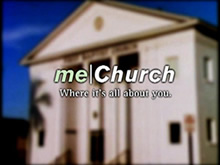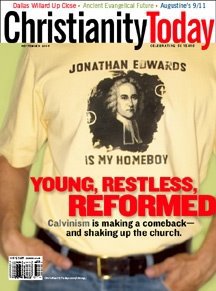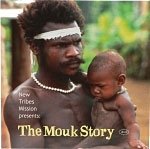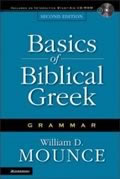I have transcribed R.C. Sproul’s message Proclaiming the Gospel, which is part of the series Understanding the Gospel from his radio programme Renewing Your Mind. I first became aware of this message by a reader’s comment from one of my earlier posts. The audio sermon message can be heard here.
PROCLAIMING THE GOSPELDelivered by R.C. Sproul on 22 June 2006
Today we come to the conclusion of our recent study of the new document that is been released, concerning the essence of the gospel which is the
Evangelical Celebration. We’ve been looking carefully at the second part of that document, the list of articles of affirmations and denials, and of course there are eighteen such articles incorporated in this document and today we come to the final article, article number eighteen, which reads as follows:
We affirm that Jesus Christ commands his followers to proclaim the Gospel to all living persons, evangelizing everyone everywhere, and discipling believers within the fellowship of the church. A full and faithful witness to Christ includes the witness of personal testimony, godly living, and acts of mercy and charity to our neighbor, without which the preaching of the Gospel appears barren.
We deny that the witness of personal testimony, godly living, and acts of mercy and charity to our neighbors constitutes evangelism apart from the proclamation of the Gospel.
This is somewhat lengthy in the concluding article and what the document is getting at here is a strong reaffirmation of the Great Commission. And what is called the Great Commission is Christ’s mandate to His disciples and to His Church that He gave us prior to His ascension when He commanded His disciples to go into all the world and to preach the gospel to every living creature – to make disciples from all tribes and people and tongues and nations. And that has defined the missionary task of the Church since the first century.
Recently I had a discussion, not really wasn’t that recent now that I think about it, with a missionary that has been laboring at a remote part of the world, ministering to a group of people who has never seen a white person before, and they were primitive in their culture and so on and had no contact with the outside world. And this person labored with this tribe for several years and when they finally came to an understanding of the gospel, many were converted to Christ including the chief of the village.
And on one occasion the chief asked the missionary how long ago Jesus lived on the earth. And the woman tried to find a way to communicate in the language of the people the vast distance of time of two thousand years and there was no way she could make the communication possible until they talked about so many moons and so many generations and so on. And so finally, the chief took some sticks and he let each stick represents a generation and he asked the question and he said, “Did Jesus lived during my generation?” And the missionary said no. And so then he put a second stick and he said, “Well did He lived during my father’s life?” “No.” And then the third stick. “My grandfather’s life?” “No.” And with each stick that he put on the ground his confidence grew more and more that stretch. And so after he had this vast length of sticks on the ground stretching all the way back to the first century, he was beside himself and he said to her, “Well if Jesus lived so long ago, why is it that we’re only hearing about Him now?”
Well of course the only answer we can give to a question like that is that we have not been as faithful as we ought to be to the Great Commission of Christ. In fact there remain many many people on the globe today who have never heard the name of Christ. In fact today, a record is being set in the world there are more people dying today on this day in human history without ever having heard the gospel of Christ than on any day in past history. And the record that is being set today is breaking the record that was set yesterday and today’s record will be broken tomorrow because we are at a point now in history where the population expansion of the world is moving at a more rapid pace than it is the pace of the churches outreach in missionary activities to preach the gospel to every living creature. And perhaps there is no generation with less of an excuse to fulfill the Great Commission than ours because the world has become so much smaller than it was ever was in the past with our ability to travel with the modern conveniences and conveyances that we have. Again the first affirmation is a reminder that Christ commands His followers to proclaim the gospel to all living persons, evangelizing everyone everywhere.
Restrictive EvangelismNow there is a reaction in our day, against the whole enterprise of evangelism as it’s understood as been proselytizing and that people ought to mind their own business and not try to influence other people to leave whatever religion they’re in at the time to embrace Christ. In fact, in many churches in our day that are engaged in evangelism here in the United States, it’s passively assumed that certain people or certain groups, either ethnic groups or religious groups are out of bounds for evangelism because if you begin an outreach to Muslims or to Buddhists in the neighborhood or to the Jewish community in the neighborhood, you expose yourself to much hostility as evangelism inevitably involves a conflict of ideas - which conflict of ideas can sometimes escalates into more serious kind, if there is such a thing as a more serious kind of conflict than that. And so, many of us are very passive or very restrictive in the outreach of our churches and don’t fulfill the mandate to preach the gospel to all people everywhere. Not only do we fail it in the international level, but we fail to fulfill the Great Commission even at the local level where we live.
It’s says the command is to proclaim the gospel to all living persons, evangelizing everyone everywhere, and discipling believers within the fellowship of the church. Now that’s there for a reason: that the mandate of the Great Commission is not merely to proclaim, but it is also to educate or to disciple. In Jesus’ Commission, He said preach the gospel and make disciples. Now a disciple is a learner in biblical terms. And a disciple is a student. And that means after people respond to the gospel, they’re to be engaged in more than enjoying the fellowship of the Church or even the worship of the Church, they are also called to be deeply involved in the educational exercise and operation of the Church, because the Church exists not only to proclaim but also to ground the converts to Christ in the deep understanding of the things of God. And the early Church is the distinction was between
didache, which is the educational catechetical instruction as distinguished from the
kerugma, which was the proclamation. The early Church saw evangelism and those who responded to the evangelism, wherein brought into the fold of the Church and that began the nurture and discipling as students and followers of Christ.
Now it goes on to say, a full and faithful witness to Christ includes the witness of personal testimony, godly living, and acts of mercy and charity to our neighbor, without which the preaching of the Gospel appears barren. Now let me say first about this, that this section of article eighteen speaks about different ways to bear witness to Christ.
Evangelism and WitnessingNow, I’ve said before in other programmes and I’ll say now again in this context. In the New Testament there is a difference or a distinction between evangelism and witnessing. And I say that for this reason that in the contemporary popular jargon of Christians, Christians tend to use the term, to witness, as a synonym for the verb, to evangelize. As if the words were interchangeable. Now, to bear witness to Christ is to call attention to Him in many different ways. We do it by the examples we seek to set with godly living. We seek to bear witness or to make manifest the presence of Christ through deeds and acts of mercy by feeding the hungry and giving shelter to the homeless and all of these charitable endeavors. Those are all kinds of witnessing, but they are not evangelism. Evangelism is one form of witnessing. So that all evangelism does bear witness to Christ so all evangelism is witnessing, but not all witnessing is evangelism. There are many ways that we bear witness to the Lordship of Christ. One of which and we may even say, the chief of which is the proclamation of the gospel.
Why do we say this? It’s important because many people say, "Well, I do my evangelism by my example. I don’t ever proclaim Christ with words, I proclaim Christ with my life." Now what can your life tell people about the content of the gospel? They can look at you from now and till Kingdom come and still know nothing of the atonement of Christ, know nothing of the resurrection of Christ, know nothing of the doctrine of justification by faith alone. How can anybody read that simply by watching your life? Your godly example may provoke somebody’s interest and say, why did you live the way that you live? That may the occasion for you to explain the gospel to them but the bare naked example itself will not communicate the gospel to people. And sometimes we use that as an excuse for remaining silent and not proclaiming the gospel to people. Say well I’m not going to push my views on them verbally. I’ll wait until they respond to my stellar example. The other weakness of this argument is few of us are so far along in our sanctification that the world is beating a path to our door, knocking on our door saying, “What is it that makes you so special? What do you have that I don’t have? And tell me how I can get it.” In fact, the closest scrutiny they give to us, they wonder whether we believe the gospel at all.
But it goes on to say, a full and faithful witness to Christ includes, for example, the witness of personal testimony, the witness of godly living, acts of mercy and charity to our neighbor, without which the preaching of the Gospel appears barren. Now obviously if I show no concern for the basic daily needs of my neighbor and all I do is to preach to them about Jesus, my preaching will sound and seem barren to them. Remember it is through the preaching that God has chosen to save the world and it is the gospel that God uses His power to bring people to Christ and God may even use that proclamation despite my one-dimensional character of it. But at the same time, we are warned in the New Testament by James for example, when James writes to his people, when he says in chapter two of his epistle, “What does it profit my brother if someone says that he has faith but does not have works? Can faith save him?” In the midst of that critical discussion, in the second chapter, James, he says this, “If a brother or sister is naked and destitute of daily food and one of you says to them, depart in peace. Be warmed and filled. But you do not give them the things which are needed for the body, what does it profit?”
See what kind of witness is that if we just say to people, be warmed and be filled? That is a barren witness, and that is the biblical text that underlies the sentiments that is expressed here in article number eighteen. Now when we get to the denial we read this: “We deny that the witness of personal testimony, godly living, and acts of mercy and charity to our neighbors constitutes evangelism apart from the proclamation of the Gospel.” I think most of us can see how our bare example of living is not evangelism. And I think that some of us can see that the very meeting of people’s worldly needs in terms of food and clothing and relief and employment and those acts of charity and mercy that the Church is to be engaged in. We could be giving away food and shelter and clothes till Kingdom come and a person still not know the gospel. They may be responding, saying hey these people care about me and they’re giving evidence of that and they demonstrate the love of God for me. But again, there is no content of the gospel that is communicated by handing somebody a loaf of bread. We are to give them the loaf of bread. We are to give them the cup of cold water. But in that cup of cold water, there is no information about the person and work of Christ. They still don’t know the gospel.
Personal TestimonyBut what about the other kind of witnessing that is specifically mentioned here and that is the giving of a personal testimony. The use of personal testimony is a very highly favorite and popular version of outreach in the evangelical church, where people stand up in church on Sunday morning or they speak privately to their friends or even to strangers on an airplane or whatever. And they give their personal testimony and their personal testimony being, what has happened to them as a result of having become a Christian?
Now I think that is a very important element of our communication of the things of God to people and there’s great value to personal testimony. But we have to remember that the personal testimony is not the gospel. God has not promised that our personal testimony would not return to Him void. God has not chosen the power of our personal testimony as the means by which He will save the world. Because what my personal testimony does is indirectly talks about Christ but specifically talks about me and my particular situation. And it may or may not relate to where the person is that I am communicating with. But the gospel relates to everybody. The gospel has objective compelling truth contained within it. And that’s what we’re proclaimed to teach. Again, the testimony may be a lead-in for that, but let’s not deceive ourselves into thinking that because we’ve given a personal testimony and therefore we, quote, share the gospel with somebody. Because the gospel has a definite content that people need to hear and need to understand.
I think for example, the New Testament of the man born blind that Jesus healed. And when He healed him, the Pharisees got all upset at the claim of his healing and they investigated the man’s family and the man’s family verified that Jesus had indeed restored the blind man’s sight. And so they came and interrogated the blind man again and say, “Well did this man really give back your sight? How did He do it?” “Well, He did it by mixing some clay and some spit and put it on my eyes.” “When was that?” “It was on the Sabbath day.” “Well then He was working on the Sabbath day. This man is an evil-doer. He can’t be an agent of God. What do you think He is?” And he said, “Well I think He is a prophet.” They pushed the interrogation further with him and finally he says out of frustration presumably, “Hey, all I know is that once I was blind and now I see. You guys figure it out.” He wasn’t a theologian. He himself did not yet know the full content of the gospel. All he knew was Jesus has done for him. And that’s valuable. Because even we don’t have a grip on the full content of the gospel, we can become a witness for Christ the day that we are converted by sharing with other people what Christ has done in our lives. But again, we must never let the personal testimony become a substitute for the proclamation of the gospel itself.
Again the denial, “We deny that the witness of personal testimony, godly living, and acts of mercy and charity to our neighbors constitutes evangelism apart from the proclamation of the Gospel.”
SHORT INTERMISSION
At the conclusion of this celebration of evangelism, which is interdenominational, there is a statement of commitment that is attached to the end of the document that reads as follows:
As evangelicals united in the Gospel, we promise to watch over and care for one another, to pray for and forgive one another, and to reach out in love and truth to God's people everywhere, for we are one family, one in the Holy Spirit, and one in Christ.
Centuries ago it was truly said that in things necessary there must be unity, in things less than necessary there must be liberty, and in all things there must be charity. We see all these Gospel truths as necessary.
Now the point of this concluding commitment is this: that though there is a wide diversity of faiths represented here and denominations and those who are involved in this document, and though there is a clear recognition that there are all kinds of theological issues that still divide us at this point and at that point, what the document is focusing on is that which has been the glue and cement of evangelical unity since the Reformation – the Gospel itself. This is the necessary point by which Christians can come together in fellowship.






 I will be doing a paper on a book by Mark Shaw, titled
I will be doing a paper on a book by Mark Shaw, titled 
 Last month, I submitted a paper that compare and contrast the liturgical services of an Anglican church and a Roman Catholic Church. In order to do the paper, I had to visit
Last month, I submitted a paper that compare and contrast the liturgical services of an Anglican church and a Roman Catholic Church. In order to do the paper, I had to visit  "EE-Taow" means "it’s very true" in the Mouk language.
"EE-Taow" means "it’s very true" in the Mouk language.



























